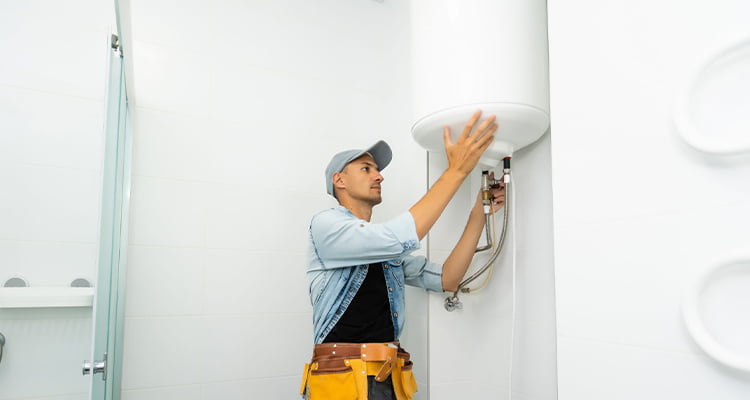
Are you tired of cold morning showers that send shivers down your spine?
When it comes to ensuring comfort and convenience within your home, few things are as essential as having hot water. Whether you’re stepping into a soothing shower or tackling the mountain of dishes that have accumulated after a family dinner, having access to hot water is non-negotiable.
But with a plethora of options available, how do you choose the right hot water tank that meets your needs while also being energy-efficient and cost-effective? As a professional HVAC contractor, we will guide you through the process of selecting the ideal hot water tank for your home. So let’s get started.
Types Of Hot Water Tanks
Hot water tanks come in various types, each with its own advantages.
1. Conventional Storage Tanks
Conventional storage tanks are a traditional option that has been widely used for decades. They consist of an insulated tank where water is heated and stored until it’s needed. While these tanks are readily available and come in various sizes, they do have a drawback – they continuously heat the water, leading to standby energy losses.
However, technological advancements have led to more energy-efficient models, mitigating this issue.
2. Tankless Water Heaters
Tankless water heaters, also known as on-demand water heaters, have gained popularity for their energy efficiency and space-saving design. Unlike storage tanks, these heaters heat water only when you need it. This eliminates standby energy losses and ensures a constant supply of hot water. While the initial cost might be higher, the long-term savings on energy bills can be substantial.
3. Heat Pump Water Heaters
Heat pump hot water tanks utilize electricity to move heat from the air or ground to heat the water. They are significantly more energy-efficient than conventional electric water heaters, making them an eco-friendly option. However, their performance can be affected by the climate of your location, as they rely on external heat sources.
4. Solar Water Heaters
Harnessing the power of the sun, solar water heaters are an environmentally conscious choice. They use solar panels to heat the water, which is then stored in an insulated tank. While these systems can provide substantial energy savings over time, they are dependent on sunlight availability.
Factors To Consider
Energy Efficiency
Choosing an energy-efficient hot water tank not only reduces your carbon footprint but also saves you money in the long run. Look for tanks with high Energy Factor (EF) ratings – the higher the rating, the more efficient the unit.
Fuel Source
Hot water tanks can be powered by electricity, natural gas, propane, or even solar energy. Each fuel type comes with its own set of advantages and considerations. For example, electric tanks are easy to install, while natural gas tanks are known for their quick heating abilities. Consider the availability of fuel sources in your area and their costs.
Size And Capacity
The size of your household plays a significant role in determining the hot water tank capacity you need. A larger family would require a tank with a higher capacity to ensure everyone gets their share of warm water. The last thing you want is someone getting an unexpected chilly surprise midway through their shower.
Longevity And Durability
Investing in a hot water tank is a long-term commitment. You want a tank that will withstand the test of time. Stainless steel tanks, for instance, are known for their durability and resistance to corrosion. Prioritize quality and materials when making your decision.
Also Read: Tried And Tested Fall To-Do List For Your HVAC System
Upfront Costs And Long-Term Savings
Consider the initial investment and the potential savings over time. While some tanks might have higher upfront costs, their energy efficiency can lead to substantial savings on monthly bills.
Installation Considerations
Installing a hot water tank involves more than just placing it in a corner. Factors like ventilation, plumbing connections, and safety clearances must be considered. Improper installation can lead to inefficiencies and safety hazards. If you’re not confident in your DIY skills, it’s best to consult a professional.
About Us
At Pro West Heating & Air Conditioning, we are dedicated to ensuring our customers’ happiness above all else. Our main focus is on making sure our customers are satisfied, as we believe this is the key to success. Our team excels in the repair, installation, and maintenance of central and wall-mounted air conditioners, heating systems, hydroponics, and humidifiers.
For top-notch services, reach out to us today.